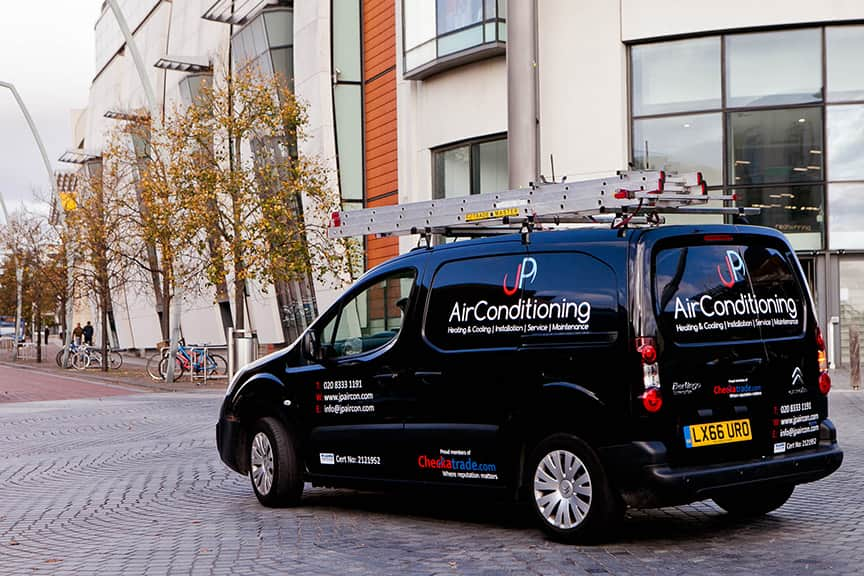Ground source heat pumps for homes and businesses in London
Ground source heat pumps offer a highly efficient and environmentally friendly way to heat your home or commercial premises in London. By harnessing the natural warmth stored in the ground, these systems deliver reliable heating throughout the year, while significantly reducing your energy costs and carbon footprint.
At JP Air Conditioning, our experienced engineers can handle the entire installation process for you, from initial consultation to final commissioning. Whether you’re fitting a system for a domestic property or a larger commercial site, we’ll recommend the most suitable ground source heat pump based on the specific size, layout, and heating requirements of your space.
These systems are a smart alternative to traditional boilers, offering excellent long-term value. Many systems can be reversed in summer to provide energy-efficient cooling, making them ideal for year-round comfort. Every unit we install comes with a minimum 5-year warranty, giving you peace of mind that your investment is protected.
Types of ground source heat pumps we install in London?
At JP Air Conditioning, we install various types of ground source heat pumps for both residential and commercial properties across London. These systems operate by installing ground arrays beneath your property—this consists of a network of pipes, known as ground loops, which are typically laid under your garden or available land.
- Depending on the ground conditions and the space available, we offer two main options: a horizontal loop, placed in shallow trenches, or a vertical borehole system, where deep holes are dug and the loop is positioned vertically. Both types require precise design and installation, which is why our trained engineers manage every stage with careful planning and attention to detail.
- Thanks to the consistent underground temperatures, the system extracts thermal energy from the ground. This energy is absorbed by a brine or antifreeze mixture circulating within the loop. The heat is then compressed to a higher temperature using a compressor and passed through a heat exchanger to be transferred to an indoor unit containing a hot water cylinder, providing your domestic hot water.
- The system can also be connected to your existing radiators or underfloor heating system, allowing it to supply efficient central heating throughout the building. Not only is a ground source heat pump far more energy efficient than traditional boilers, but it can also drastically reduce your carbon emissions.
- Most systems are powered by around 80% renewable energy extracted directly from the ground and only 20% electricity, making them a highly cost-effective and eco-friendly solution for long-term heating in London homes and businesses.
Got a question about ground source heat pumps in London?
If you’d like to know more about ground source heat pumps in London, our team at JP Air Conditioning is here to help. Whether you’re curious about how the system works, what installation involves, or whether it’s suitable for your home or business, we’re happy to provide expert advice tailored to your needs.
Call us today on 020 8333 1191 or email info@jpaircon.com to speak directly with our knowledgeable team. Alternatively, you can complete our online enquiry form—just include your name, email address, telephone number, and a brief message, and we’ll get back to you promptly with the answers you need.
SEE SOME REVIEWS
What heat pump manufacturers do we work with in London?
At JP Air Conditioning, we install ground source heat pump systems from some of the most trusted and reputable manufacturers in the industry. Every system we supply is carefully selected for its proven reliability, energy efficiency, and long-term performance—ensuring your home or commercial property in London benefits from consistent, cost-effective heating.
All of our installations include a minimum 5-year warranty, giving you complete peace of mind in the unlikely event of any issues. As certified Daikin D1 Partners, we’re also able to offer an extended 7-year warranty on Daikin heat pump systems—an excellent option for customers seeking extra assurance and value.
We regularly install systems from leading brands, including:
- Daikin
- Mitsubishi
- Ecodan
- Toshiba
- Fujitsu
- Panasonic
Our ground source heat pump installation process
in London
Installing a ground source heat pump is a multi-stage process that requires careful planning and expert execution. At JP Air Conditioning, we take a methodical approach to ensure every component is installed correctly and that your system delivers optimal performance for your London property.
- On-site survey: Before we begin, we’ll carry out a detailed survey of your property to assess its suitability for a ground source heat pump system. This allows us to determine the most effective layout for ground loops or boreholes and evaluate the best approach for your installation.
- Personalised quotation: Based on the findings from the survey, we will provide a clear, tailored quotation. We’ll also discuss the most cost-effective installation options that match your property’s heating and hot water needs.
- Groundworks and system installation: Once you approve the plan, installation begins. We collaborate with trusted contractors to carry out any necessary excavation work, either trenching for ground loops or drilling for vertical boreholes. Our qualified plumbers and renewable heating engineers will then connect your heat pump to your heating system and domestic hot water supply.
- Testing and commissioning: To ensure your system is fully operational, we conduct extensive field testing. We run your heat pump for a minimum of two days to confirm it is performing efficiently. We then complete commissioning of all key components so that you can enjoy reliable heating and hot water from day one.
Why choose us for ground source heat pump installation
in London?
At JP Air Conditioning, we make ground source heat pump installation simple, efficient, and tailored to your needs. Here’s why homeowners and businesses across London choose us for their renewable heating solutions:
-
Start to finish installation
From the initial consultation through to final commissioning, we manage the entire installation process. That includes site surveys, excavation planning, system fitting, and final connection. Once complete, your property will be equipped with a fully operational ground source heat pump, ready to deliver efficient, sustainable heating.
-
Tailored to your needs
Every property is different, and so is every heat pump system. We take the time to understand your heating needs, recommending the most suitable solution—whether it’s a ground or air source heat pump. We’ll guide you through the available options from trusted manufacturers, ensuring you make an informed decision that maximises performance and efficiency.
-
Extended warranties
All our heat pumps come with a minimum 5-year warranty. As an approved D1 heat pump installer for Daikin, we can also offer extended warranties of up to 7 years on Daikin systems. You can rely on long-term protection and confidence in your investment.
-
Experienced
Our experienced engineers specialise in heat pump installation, maintenance, and repairs. Fully trained and qualified, they follow strict safety procedures and best practices to ensure that your system is installed correctly and functions at peak capacity from the moment it’s switched on.
Enquire today about ground source heat pumps in London
Ready to explore the benefits of ground source heat pumps for your London property? Our expert team is here to help. Call us on 0208 333 1191 or email info@jpaircon.com to discuss your requirements, get professional advice, or book a site survey. Prefer to enquire online? Simply complete our online quote form and we’ll get back to you within 24 hours.
FAQs – Air conditioning in London
Are ground source heat pumps worth it in the UK?
Yes, ground source heat pumps can be a smart long-term investment in the UK. They’re incredibly efficient at extracting natural heat from the ground to warm your home, which helps reduce your reliance on gas or oil.
What are the downsides of a ground source heat pump?
The main downside is the upfront cost. Installation is more expensive than traditional heating systems, and it involves digging up land to lay the ground loop, which may not be suitable for all properties. You also need outdoor space, and the system works best with underfloor heating or larger radiators. That said, once installed, they’re low-maintenance, efficient, and environmentally friendly.
How much does it cost to install a ground source heat pump in the UK?
On average, the cost of installing a ground source heat pump in the UK ranges between £18,000 and £35,000. This includes the heat pump unit, ground loop installation, and any internal upgrades (like radiators or controls). The final price depends on your home’s size, the complexity of the installation, and the type of ground loop (horizontal or vertical).
How many ground source heat pumps are there in the UK?
As of recent estimates, there are around 50,000–60,000 ground source heat pumps installed across the UK. While this number is growing each year, they still represent a small fraction of the country’s total heating systems – but uptake is expected to rise as the UK moves towards its net zero goals.
Why are heat pumps not popular in the UK?
Heat pumps, including ground source systems, are still relatively new to the UK market compared to traditional boilers. Their higher upfront cost and installation complexity can deter homeowners, especially when retrofitting older properties.
What is the difference between a heat pump and a ground source heat pump?
The term heat pump is a general one – it refers to systems that transfer heat from one place to another. A ground source heat pump extracts heat from the ground using buried pipes filled with a fluid. In contrast, an air source heat pump pulls heat from the outside air. Ground source systems tend to be more efficient because ground temperatures stay relatively stable year-round, but they require more space and a higher initial investment.


